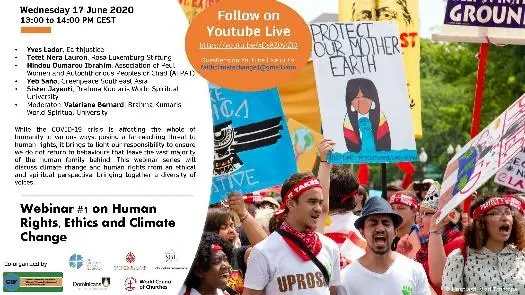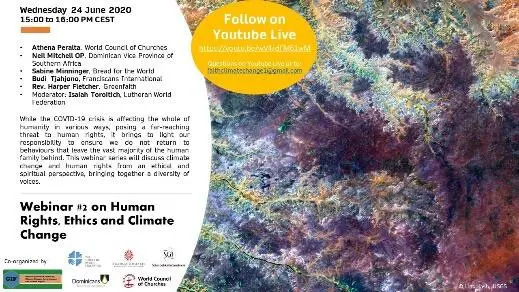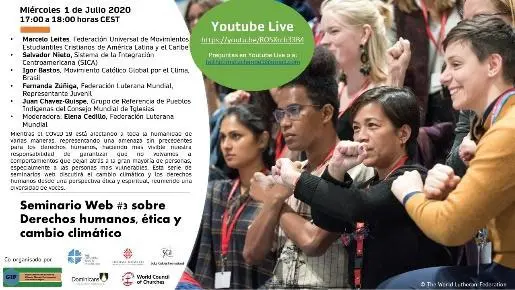
Webinar #1: Human Rights, Ethics and Climate Change
Wednesday 17 June from 13:00 to 14:00 PM CEST
Moderated by: Valériane Bernard, Brahma Kumaris World Spiritual University
This first panel aimed at engaging grassroots partners, informing the general public, and proposing a spiritual perspective.
Yves Lador, from Earthjustice, reminded that it is important to look at climate change from a human rights perspective because of both its direct impacts on a range of human rights such as the rights to health, food, or housing, and its indirect impacts, which derive from the measures adopted to combat climate change. Focusing only on reducing CO2 emissions can lead to worse situations that violate the right to self-determination, increase vulnerability and marginalization, impact livelihoods and culture. Human rights provide both accountability – are we really working to reduce the effects of climate change – and the capacity to act for affected people. It is interesting to see what is happening with the Covid crisis: decisions are taken regardless of where the people are and how they can cope. However, if you don’t respect human rights, you weaken resilience and the capacity to react.
Tetet Nera-Lauron, from Rosa Luxemburg Stiftung, highlighted the interlinkages between climate justice and gender justice. Exploitative production processes are also taking the rights, lands, and health of others. Women are disproportionately negatively impacted. 6 out of 10 of the world’s poorest are women; 2/3 of the illiterate adults are women; women bear the brunt of unpaid care work. Climate crisis exacerbates existing injustices. Social norms make women particularly vulnerable in the face of climate change. These include restricted clothing, assigned roles as caregivers in the family, cultural practices that women cannot move without male family member. Data show that women are more likely to die in climate related extreme weather events. The struggle for women equality is part and parcel of the struggle for climate justice.
Hindou Oumarou Ibrahim, from the Association of Peul Women and Autochthonous Peoples of Chad (AFPAT) shared the perspective of indigenous peoples who make up less than 5% of the world population but support about 80 % of the global biodiversity. Indigenous and local communities around the world are depending on land resources. They have long years of living in harmony with ecosystems. Now conflicts over resources are threatening the Lake Chad region for instance, where in the past few decades 90% of fresh water has disappeared while 40 million people are depending on its resources. This violates the human rights of peoples. Both the climate and Covid crises are hitting the most vulnerable: when you don’t have clean water to drink, how can you wash your hands? The money injected for the recovery must not support extractive industries but must be used for sustainable development and to respond to communities’ needs, to reinforce infrastructures (health, education, access to the market), and renewable energy.
Yeb Saño, from Greenpeace Southeast Asia, reminded us that we live in the same world as before the Covid crisis: the climate crisis has not disappeared. We live in the same world order that betrayed us. As a community we must use this disruption for the wellbeing of society, to create peaceful, egalitarian societies that strive for the public good. There are clear climate injustices: communities in the Global South have paid for too long for the greed of others. Communities living under the threat of climate change cannot have access to most basic human rights.
Sister Jayanti, from Brahma Kumaris World Spiritual University, shared that in her view, the Covid crisis has pushed to the realization that we are one human community, one world. The virus knows no boundaries. Our love and humanness know no boundaries as well. If we can come back to the inner identity of the self, we can connect with the human family and cooperate rather than enter conflict/competition. We’re in the same boat. With the spirit of cooperation, as one people we can find ways to overcome issues. There is an issue of justice: all human beings have the same rights: we cannot continue with 20% of the world population claiming access to 80% of resources. People need to remember their inner power.
After the presentations, the discussion focused on what political conditions we need to fulfill now to have a fairer world tomorrow. Hindou mentioned there are now tools within the UNFCCC context for instance, there is a recognition of indigenous people’s rights through the Local Communities and Indigenous Peoples Platform (LCIPP). This means that governments cannot just come with solutions without consulting with indigenous peoples and respecting their rights. The international framework also recognizes indigenous peoples’ knowledge to protect the land, territory and resources. The question now is how to include this into the national adaptation and mitigation plans. Tetet highlighted that UNFCCC has not taken a break during the pandemic to show that the work on climate change is continuing. However, we are on the 26th year of such negotiations and pledges are not enough to keep us from burning. 2020 is the 75th anniversary of the UN and multilateralism is facing a crisis of legitimacy and relevance because of a lack of accountability. People through their movements have to ask for accountability. Sister Jayanti shared that people have now been given a voice and that their voice is being heard. Yves considered that the crisis is actually a power struggle. The lever we have is at the level of national determined contributions (NDCs). They have to be determined at the national level, so movements at the country level have to request real strong ambitions. In the preamble of the Paris Agreement, there is the strongest reference to human rights that we can find in any environmental treaty until now. Yeb concluded by saying that Covid19 is not a war with a virus, it’s a war with ourselves. It’s a wake-up call.
Webinar #2: Human Rights, Ethics and Climate Change
Wednesday 24 June from 15:00 to 16:00 PM CEST
Moderated by: Isaiah Toroitich, Lutheran World Federation
This second panel aimed at providing a technical discussion on selected issues relating to human rights and climate change providing an ethical perspective.
Athena Peralta, from the World Council of Churches, shared the perspective that as faith communities, we believe that human rights are rooted in the ethical, moral and spiritual understanding that all human beings have inherent dignity. In terms of institutions and policy, human rights help secure the respect for the dignity of life. Faiths teach us to look at the larger picture, the interconnections and relationships. The GIF issued a statement on Covid19, climate change and human rights which reaffirms that the global health and climate emergency are rooted in an unjust and ecologically destructive economic system. Both crises interlink, multiplying the impacts on people’s human rights, especially for marginalized or vulnerable groups. In this regard, in its statement the GIF called for states to ensure the full and equal enjoyment of economic, social, cultural, civil, and political rights and the transition to a sustainable, resilient, and net zero-carbon economy and society in a post- Covid-19 world.
Therese Arnesen, from the Office of the High Commissioner for Human Rights (OHCHR), reminded that climate change impacts the human rights of all people and that it is happening right here and now. It disproportionately impacts people that are already in vulnerable situations. For instance, Small Island Developing States (SIDS) have contributed less to global emissions but they are suffering more. States have a human rights obligation to prevent the foreseeable impacts of climate change. During the 44th session of the UN Human Rights Council (HRC), there will be a panel discussion on climate change and people with disabilities. Participation and inclusion are key both as beneficiaries and in decision- making. Disability-inclusive and a human rights-based approaches to climate change are not just a moral and ethical imperative, it also empowers people with disabilities and others, as agents of change, it prevents discrimination and makes climate action more effective.
Fr. Neil Mitchell OP, from the Dominican Vice Province of Southern Africa shed light on the commodification of sentient animals. If we put only human rights at the center, we are leaving some dots unconnected. We need to see a more inclusive picture, that includes non-humans inhabitants of the Earth. In the Covid-19 crisis, we tend to pose ourselves as victims, on a war
footing against nature. It is not often said that it is our behavior that produced this. For years, we’ve removed the natural barriers that would protect us from these viruses. We now have animals packed together in the markets, in close contact with human beings, stressed, with a compromised immune system. Pandemics are a product of our human footprint. Similarly, we have to change our behavior and recognize that we are the cause of climate change. A new conscious way of living, a new story is yearning to be born. The Black Lives Matter movement shows that people are starting to find their voices in searching for a kind of society where there are no more injustices. It must extend to animals.
Sabine Minninger, from Bread for the World, discussed the Loss and Damage (L&D) mechanism within the UNFCCC. Some countries such US and Australia have been very outspoken against L&D referring to humanitarian aid as being enough. It is not however. Countries have pledged to contribute USD 100 billion a year for adaptation measures as of 2020, but we don’t know what will happen. L&D are four times more important than adaptation measures. If there is no finance mechanism, it means people cannot recover where they are, it means more conflict and displacement. Now, with the Covid-19 crisis, the lockdown measures are creating problems for people to provide for their livelihoods. Furthermore, super storms such as cyclone Amphan, hit Fiji, Bangladesh and India while in lockdown and people had to face the question of whether going to an evacuation center or staying home to preserve their life. Evacuation centers were at least provided. In Bangladesh and India, 3 million people left their home temporarily because of cyclone Amphan.
Budi Tjahjono, from Franciscans International, provided an overview of how the HRC has addressed the link between climate change and human rights, with its first resolution in 2008. In 2010, during the Social Forum, the idea of establishing a special procedures’ mandate on climate change and human rights was first discussed. There are many mandates, but the issue of climate change has not received a proper focus by and of itself. Civil society organizations have been pushing for climate change to be discussed from a human rights- based approach. The HRC and the OHCHR have done many studies to assess the impacts of climate change on human rights from several angles: health, children, migration, disabilities. The Independent Expert on International Solidarity will present her report on climate change, in which she discusses the importance to ensure that climate actions comply with human rights obligations. In December 2019, during COP25, the Marshall Islands, on behalf of the Climate Vulnerable Forum, reaffirmed the importance of creating this mandate. Under the leadership of Bangladesh, we hope that in 2021 this mandate will be adopted, to assist, identify, and engage directly with affected vulnerable groups. This mandate would also link the HRC and UNFCCC. Some states are in favor, some are opposing such a mandate and we need to address it.
Harper Fletcher, from Greenfaith, discussed the complex issue of geoengineering. Governments must act with urgency. The further extension of the capitalistic market ethos is worrying because it is so prone to greed and corruption. The challenge is that, because we are so far behind in terms of emissions reduction, there are no easy solutions. Small scale projects of tree planting are valuable, but they are not coming to the size we need. Climate geoengineering solutions are rapidly developing, and we need to take a stance. Any use of climate engineering in any form, must absolutely be linked with policies and concrete verifiable steps to significantly reduce fossil fuel usage. It is a moral obligation. Climate engineering governance must be transparent, robust, inclusive and it must prioritize the interests of climate vulnerable constituencies. No governments should be able to use it for itself. Faith communities must recognize that any use of geoengineering will have impacts far beyond climate change-related impacts. Greenfaith supports a moratorium on solar geoengineering, the immediate establishment of the link to commensurate decrease of fossil fuels usage and the principle that modifying the weather can only be used for peaceful uses.
A discussion followed with several questions from the public. Sabine addressed the question of how to mobilize resources and she mentioned that climate finance should be mobilized through public and innovative sources, such as tax on CO2, aviation, shipping emissions. Therese addressed the question of the meaningful participation of persons with disabilities, highlighting that there are discussions to have a specific constituency under UNFCCC, but it is already important that the information and venues be accessible. Effective decision making also comes with better disaggregated data. Neil shared his perspective on the new lab- produced meat products as a great step forward as it means animals are not going to be slaughtered or confined in factory farms. Ultimately, however, it would be better to do away with meat altogether. Harper concluded on the precautionary principle being highly appropriate to address the issue of geoengineering.
Webinar #3: Human Rights, Ethics and Climate Change (in Spanish)
Wednesday 1 July from 17:00 to 18:00 PM CEST
Moderated by: Elena Cedillo, Lutheran World Federation
This third panel aimed to bring the voices from the Global South, especially those who have not the opportunity to participate in the Human Rights Council, and to bring a specific Latin American perspective of the issue.
Marcelo Leites, from the World Student Christian Federation for Latin America and the Caribbean (WSCF), highlighted the intrinsic relations between human rights and climate change and its impacts on all human rights. Climate change is a risk multiplier affecting even more people that are already living in a situation of vulnerability. The specificity of Latin America and the Caribbean (LAC) is that it is a region with the world’s most unequal societies. Then Covid-19 arrived. For the poorest communities, Covid-19 is also a multiplier of existing threats. People want a new system. They want change. There is constant tension in LAC and Covid-19 has accelerated the existing climate change crisis. LAC is also the world’s most dangerous region for environmental human rights defenders. For instance, in Colombia, an environmental human rights defender is assassinated every 4 days. There are also lots of fundamentalist movements in LAC which are denying climate change and now Covid-19. They are anti-quarantine, and combine with market liberalism ideologies. Recently, there has been more social control and persecution of social movements, spying, and the decreasing of public civic space. These are among the most important challenges for social movements.
Salvador Nieto, from the Integration System for Central America (SICA), discussed the fact that the region is really vulnerable to climate change. Currently, governments cannot invest to fight climate change. However, we need a conjunction of public and private investments, working for adaptation. The tropical storm Amanda hit when Covid-19 arrived. This is an example of how pre-existing vulnerabilities combined with an extreme weather event related to climate change can create disastrous effects. Covid-19 is a zoonosis. We know that the most resilient economies have the power to resist. We need to think about building back the necessary infrastructure to develop resilient economies.
Igor Bastos, from the Global Catholic Climate Movement in Brazil (GCCM), shared that because the current crisis is interlinked with environmental, social and economic aspects, it is very difficult to have a vision of what will come after the pandemic. When we compare responses to the Covid-19 and climate change crises, we can see the extent of the challenge and the extent of the deniers’ movement. Although the numbers of affected and deceased individuals is published, although the hospitals’ capacities are saturated, this denying movement is a real challenge and will remain after the Covid-19 crisis is over. Impacts are not the same for all and the social situation is so complex that Covid is just one other issue amidst all the challenges faced by local communities. It is important to highlight however that there is a false dichotomy between protecting life and protecting the economy. Life must be put at the center of everything. There is a loss of sensibility when the loss of life is too big: it just becomes numbers. We need to think about the impacts of protecting life in all its aspects. In many local communities, there has been tremendous solidarity as a result of Covid-19. There is so much to learn from these local movements that support local communities, often starting from religious movements. There are ways to rethink the economy in a way that will support human life: the economy mentioned by Pope Francis, or the thoughts about establishing a basic income.
Fernanda Zúñiga, a youth representative from the Lutheran World Federation in Chile, shared that there are several youth campaigns to raise awareness about climate change, and digital projects in the region, social networks have become a space where young people continue raising their voice for climate justice. However the pandemic seems to have silenced the climate crisis. It is a challenging situation as so many people suffer the impacts of a crisis that they have not contributed to. Young people express their concern about how the economies will reactivate after the pandemic, it is necessary that the economic reactivation plans are sustainable. Another challenge was that civil society couldn’t participate in the NDC process because of the pandemic. Among the “confined generation”, there is the generation of the youth who are around 20-25 years old, young people that have already lost their jobs and who will not be able to get back to studies because of the current crisis.
Juan Carlos Chavez-Quispe, from the World Council of Churches Indigenous People’s Reference Group, addressed the invisible impact of climate change as a destabilizing factor for indigenous peoples’ communities. For instance, migration, as a direct consequence of climate change, is a problem for some and an opportunity for others. We need to keep the link with Pachamama and the awareness of our interconnectedness. The loss of traditional knowledge and the unbalance between human beings and other living beings are challenges that are made worse by governmental policies that, although seemingly adopted for the welfare of people (such as dams), are not based on an integral vision. These policies have allowed extractive industries and patriarchal projects to take over populations’ wellbeing. This affects the dignity of the land and the people, especially of indigenous peoples. We need to move towards equality and away from the traditional view that indigenous peoples need to be civilized.
The discussion after the presentations focused on what is needed now in terms of policy in light of the specific situation of Latin America and the Caribbean. Igor considered that in the context of such a complex global crisis, it is important to rethink the economy so that it can support life and people, developing ideas such as the basic income for all. Fernanda mentioned that it is important to continue the work that is being done on climate justice, and to enable new generations to join in that work. In Chile, in the face of the big powerful industries (electricity, water…), it is important to effectively make sure that the voices of the people who are suffering from climate change are heard. Salvador mentioned that we need to rethink the way we live, our public infrastructures and ecosystems. Public policies are extremely important and this will be the challenge to come. Marcelo considered that, the crisis has shown that the system is failing and the current political and economic systems cannot give the needed response. We need to share reflections, via social media and networks, on what wellbeing or fulfilment truly means, which is at the heart of faith-based movements. We also need to keep the issue of climate justice and disseminate the importance of instruments such as the Escazú Agreement that aims at providing access to information, participation and remedy in case of human rights violation. Juan Carlos added that it is extremely important that states recognize the diversity of people that are constituting a country, recognizing their existence and needs and respect and respond to them.
Download this document (PDF)
Tags: Geneva Interfaith Forum, Webinar Series on Human Rights Ethics and Climate Change





